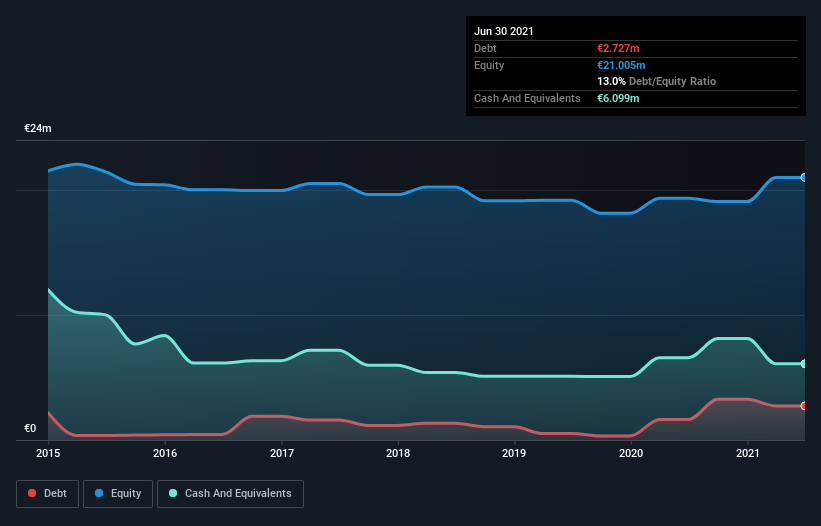
David Iben put it well when he said, 'Volatility is not a risk we care about. What we care about is avoiding the permanent loss of capital.' It's only natural to consider a company's balance sheet when you examine how risky it is, since debt is often involved when a business collapses. We note that Elve S.A. (ATH:ELBE) does have debt on its balance sheet. But should shareholders be worried about its use of debt?
What Risk Does Debt Bring?
Debt and other liabilities become risky for a business when it cannot easily fulfill those obligations, either with free cash flow or by raising capital at an attractive price. Part and parcel of capitalism is the process of 'creative destruction' where failed businesses are mercilessly liquidated by their bankers. While that is not too common, we often do see indebted companies permanently diluting shareholders because lenders force them to raise capital at a distressed price. Of course, debt can be an important tool in businesses, particularly capital heavy businesses. When we examine debt levels, we first consider both cash and debt levels, together.
Check out our latest analysis for Elve
What Is Elve's Debt?
The image below, which you can click on for greater detail, shows that at June 2021 Elve had debt of €2.73m, up from €1.65m in one year. However, it does have €6.10m in cash offsetting this, leading to net cash of €3.37m.

How Healthy Is Elve's Balance Sheet?
According to the last reported balance sheet, Elve had liabilities of €11.3m due within 12 months, and liabilities of €7.15m due beyond 12 months. Offsetting this, it had €6.10m in cash and €5.29m in receivables that were due within 12 months. So it has liabilities totalling €7.08m more than its cash and near-term receivables, combined.
Elve has a market capitalization of €21.0m, so it could very likely raise cash to ameliorate its balance sheet, if the need arose. But it's clear that we should definitely closely examine whether it can manage its debt without dilution. While it does have liabilities worth noting, Elve also has more cash than debt, so we're pretty confident it can manage its debt safely.
In addition to that, we're happy to report that Elve has boosted its EBIT by 60%, thus reducing the spectre of future debt repayments. The balance sheet is clearly the area to focus on when you are analysing debt. But it is Elve's earnings that will influence how the balance sheet holds up in the future. So when considering debt, it's definitely worth looking at the earnings trend. Click here for an interactive snapshot.
But our final consideration is also important, because a company cannot pay debt with paper profits; it needs cold hard cash. While Elve has net cash on its balance sheet, it's still worth taking a look at its ability to convert earnings before interest and tax (EBIT) to free cash flow, to help us understand how quickly it is building (or eroding) that cash balance. During the last three years, Elve generated free cash flow amounting to a very robust 91% of its EBIT, more than we'd expect. That puts it in a very strong position to pay down debt.
Summing up
Although Elve's balance sheet isn't particularly strong, due to the total liabilities, it is clearly positive to see that it has net cash of €3.37m. And it impressed us with free cash flow of -€228k, being 91% of its EBIT. So we don't think Elve's use of debt is risky. When analysing debt levels, the balance sheet is the obvious place to start. But ultimately, every company can contain risks that exist outside of the balance sheet. Be aware that Elve is showing 2 warning signs in our investment analysis , you should know about...
Of course, if you're the type of investor who prefers buying stocks without the burden of debt, then don't hesitate to discover our exclusive list of net cash growth stocks, today.
Valuation is complex, but we're here to simplify it.
Discover if Elve might be undervalued or overvalued with our detailed analysis, featuring fair value estimates, potential risks, dividends, insider trades, and its financial condition.
Access Free AnalysisHave feedback on this article? Concerned about the content? Get in touch with us directly. Alternatively, email editorial-team (at) simplywallst.com.
This article by Simply Wall St is general in nature. We provide commentary based on historical data and analyst forecasts only using an unbiased methodology and our articles are not intended to be financial advice. It does not constitute a recommendation to buy or sell any stock, and does not take account of your objectives, or your financial situation. We aim to bring you long-term focused analysis driven by fundamental data. Note that our analysis may not factor in the latest price-sensitive company announcements or qualitative material. Simply Wall St has no position in any stocks mentioned.
About ATSE:ELBE
Elve
Designs, manufactures, and sells ready-made garments in France and internationally.
Medium-low with flawless balance sheet.
Market Insights
Community Narratives



